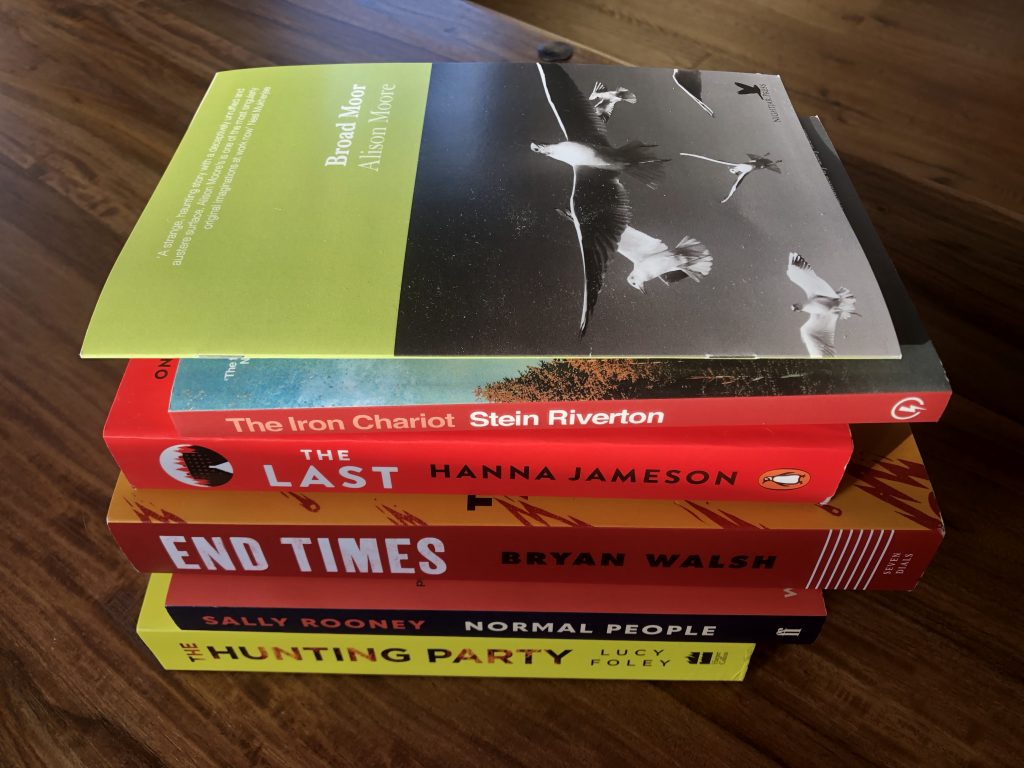
Further to my last post, I regret to inform you that Project X has – to no-one’s surprise – progressed no further, although I have dug out a couple of other ancient abandoned projects in the hope of actually doing something with them. More on that soon, if I fail to find a way of postponing work on them. But these are strange times, and I seem to be swinging wildly between feelings of “Well we might as well get this done, seeing as we’re going to be stuck in here for a while yet” and “Oh God, there’s no point in doing anything, is there?” I suspect I am not alone in this.
Last week was mostly the second, although this week seems to have a bit more of the first type of vibe to it so far, although that may simply be just because the sun’s chosen to shine. Who knows?
Anyway, here are some books that I read in February.
The Hunting Party by Lucy Foley. Massively successful whodunit – actually, for most of the book, a whodunwho, if you will – involving a cast of deeply unlikeable yuppies renting an isolated house in Scotland over New Year. Great fun, although I did feel the wheels came off slightly towards the end, because there was one thing that I was asked to believe that I just could not buy into. But a total page turner, nonetheless.
Normal People by Sally Rooney. I very nearly passed over this one after reading Rooney’s Conversations with Friends last year, because that one seemed to be about a bunch of four people who were each competing to be the most irritating. However, I’m glad I didn’t, because this was an absolute delight: two engagingly flawed main characters, trying to navigate their way through twenty-first century relationships. Rooney’s writing takes you right up close and I felt really invested in them. I was quite sad when it ended.
End Times by Bryan Walsh. Well I definitely picked the right time to read this one, didn’t I? This was basically a guide to all the ways in which the human race can come to an end, from climate catastrophe through killer robots to, yes, out of control viruses. Very thorough, but also very readable, if somewhat scary. In case you’re interested, Walsh seems to rate genetically-engineered bugs the most likely way for us all to check out, which is nice.
The Last by Hanna Jameson. [Possible spoiler alert] I felt a bit cheated by this, as the blurb suggested it was going to be a kind of post-apocalyptic ‘And Then There Were None’, which sounded a lot of fun. But it wasn’t that at all. If I’d been sold the book as a study of what might happen if you were caught in an isolated hotel in the middle of Switzerland after the Bomb dropped, I think I’d have enjoyed it much more, because there were some interesting characters and a few genuinely shocking moments in it. But the ultimately inconsequential murder sub-plot somehow got elevated to the back cover and derailed my expectations.
The Iron Chariot by Stein Riverton. Otherwise known as the first-ever Scandi Noir novel. This was a most enjoyable read – very atmospheric and full of odd red herrings. The book was something of a period piece, obviously being written for a 1909 readership rather than a 2020 one, and I’d worked out what was happening well before the end, but that didn’t really spoil it.
Broad Moor by Alison Moore. I think Moore’s ‘Small Animals’ (published, like this, as a Nightjar chapbook) is one of my all-time favourite stories and I’m always on the lookout for more of her work. Her stories are characterised by an air of unspecified, brooding menace that intensifies into something deeply sinister right at the very end – often in the very last sentence – and Broad Moor is a terrific example of this.